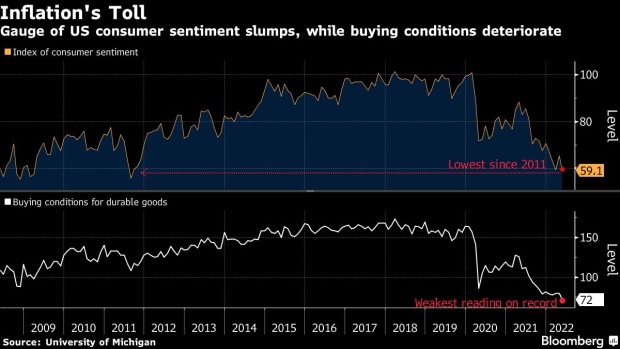May 14, 2022
Biden’s Midterm Hopes Bedeviled by Signs of Economy in Distress
, Bloomberg News

(Bloomberg) -- President Joe Biden’s hopes for a political reset have been overwhelmed by an unrelenting series of economic setbacks, adding to the challenges Democrats face as they court exhausted voters ahead of the crucial midterm election in November.
US gasoline prices are at historic highs. Inflation in April exceeded consensus forecasts. Technology stocks have plummeted, taking retirement accounts with them. A record low portion of Americans think it’s a good time to buy a house.
On top of it all, a shortage of baby formula has left parents in the world’s wealthiest country scrounging empty store shelves to feed their children. The crisis is drawing bipartisan condemnation on Capitol Hill, with lawmakers accusing the administration of moving too slowly after an Abbott Laboratories factory in Michigan was shut down over safety issues.
Cast against the backdrop of Russia’s war in Ukraine and the ongoing pandemic -- the US surpassed 1 million Covid-19 deaths this week -- it’s little wonder the nation’s mood is grim. Biden’s inability to assuage Americans’ growing unease was highlighted as a US consumer sentiment measure released Friday hit its lowest reading since 2011, a six-point decline from April that was worse than any forecast in a Bloomberg survey of economists.
The nation’s economic struggles and the administration’s tepid response are striking at a core promise of the Biden presidency: that he would return competence to the White House. And there are clear signs Americans hold their president accountable. Just 38% approve of the job Biden is doing, according to a Monmouth University poll released Thursday.
Most respondents in the survey said it’s currently difficult to pay for essentials like gas, grocery bills and health insurance deductibles.
“We understand there are challenges you’re dealing with every day,” White House Press Secretary Jen Psaki told reporters on Friday. “Costs are too high. It is too expensive to fill up your gas tank. Food is too expensive at the store. And our focus right now is on taking every step possible to address those issues.”
Yet Biden has often sought to shift blame. He’s said gasoline and food cost too much because of “Putin’s price hike,” in reference to the Russian president who ordered the Ukraine invasion, and he said this week that the Federal Reserve is primarily responsible for combating rising prices.
The baby formula crisis presents a particularly acute political risk. Democrats have looked to reorient their midterm strategy to wooing back female voters after the leak of a draft Supreme Court opinion that would overturn the landmark Roe v. Wade decision establishing abortion rights nationwide.
But Biden -- a practicing Catholic whose congressional career was dotted with votes restricting federal abortion spending -- has for now acted as a reluctant messenger, preferring sweeping legal and philosophical arguments for maintaining Roe rather than explicitly espousing his support for abortion rights.
Less than two weeks after the leak, television coverage has shifted to stories of mothers struggling to find the baby formula they need to feed their children.
“It’s pretty amazing that with all the focus on global and economic insecurity, a life challenge so personal and individual could cut through -- but it has,” said Republican pollster Frank Luntz. “When young families think about whether they are better or worse off under Biden, life challenges like this make life more difficult for Democrats.”
White House officials have argued that troubling indicators of an economy in distress should be weighed against other data that show strength. Payrolls beat consensus estimates in the past month, and unemployment is just 3.6%, offering a strong jobs picture. Year-over-year earnings were up 5.5%, and gross domestic product has grown at its fastest rate since 1984. And despite the recent stock market swoon, the S&P 500 remains up more than 5% since Biden took office.
Still, White House aides acknowledge that many Americans feel the costs of inflation more viscerally than news suggesting the overall economy is healthy -- and that some trends are unfavorable. That explains why Biden in recent days has stepped up his efforts to shift responsibility for some of Americans’ leading concerns.
Following Wednesday’s inflation report, Biden called inflation “unacceptably high” but added that action to lower prices “starts with the Federal Reserve.”
Biden has also sought to ratchet up pressure on Republicans. In a speech Tuesday at the White House, Biden said he understood Americans’ frustration so much that he could “taste” it -- but said the opposition party has yet to present a concrete plan to tackle high prices if the GOP captures Congress in November.
He has also said Republicans are pursuing an “ultra-MAGA agenda,” referring to former President Donald Trump’s “Make America Great Again” slogan, though Biden hardly ever uses his opponent’s name.
And he’s tried to spotlight a GOP proposal, written by Florida Senator Rick Scott, that would require all Americans to pay some income tax, including families that don’t earn enough money to owe taxes now, and that would require reauthorizing all federal legislation after five years. Democrats say that would imperil entitlements like Social Security and Medicare.
Other Republicans including the Senate minority leader, Kentucky’s Mitch McConnell, have distanced themselves from Scott’s plan, and the Florida senator has said in response to Biden’s attacks that the president should resign.
But Biden has also acknowledged the political vulnerability he faces.
“It’s going to be hard, because inflation is going to scare the living hell out of everybody,” he told Democratic donors in Chicago on Wednesday. “We have a problem we have to deal with. In the meantime, we can’t take our eye off all that could happen if we do not prevail.”
©2022 Bloomberg L.P.


